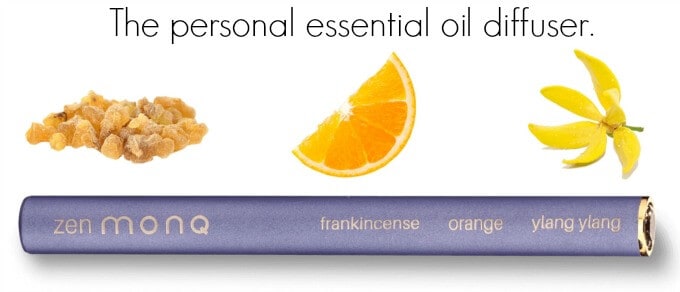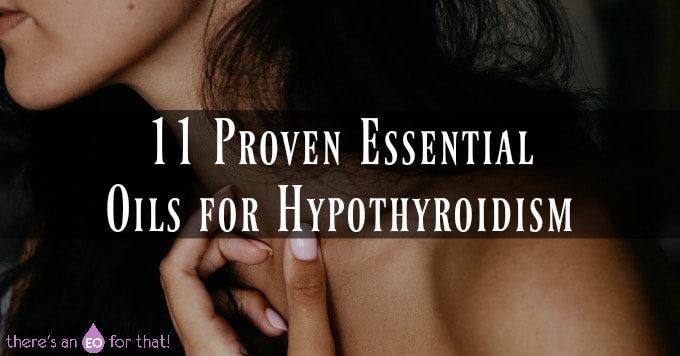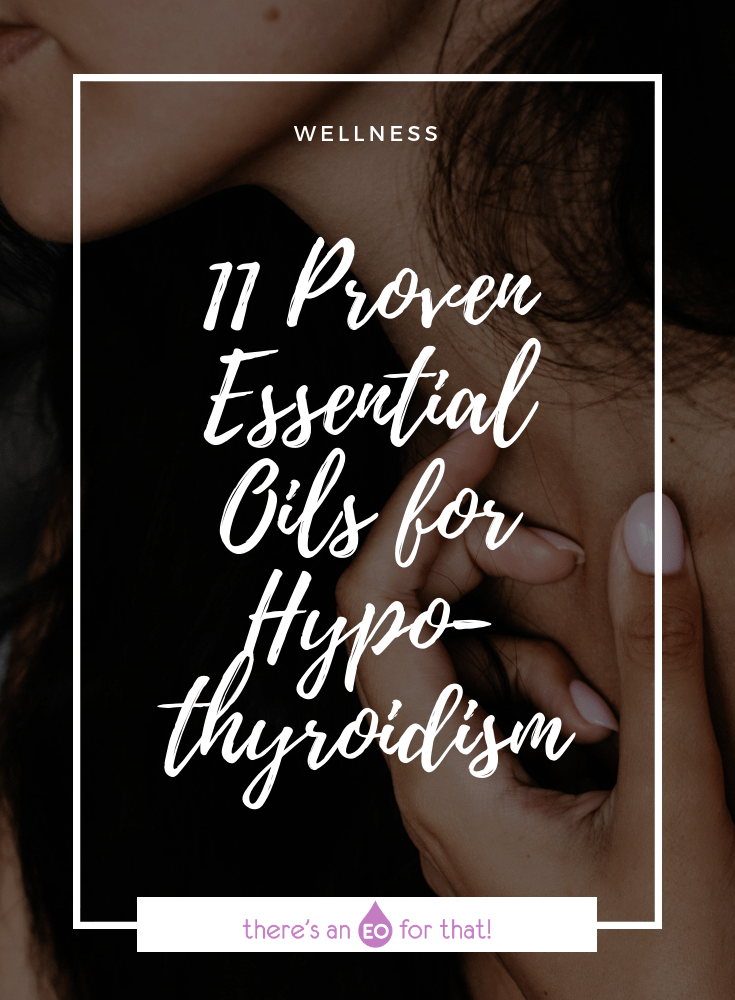Hypothyroidism, also known as an underactive thyroid, affects 4.6% of the U.S. population ages 12 and older. This condition can range from almost no signs or symptoms to life-threatening in extreme cases if left untreated. In most cases, however, those who have this condition experience daily fatigue, lethargy, weight gain, dry skin, and other symptoms that leave them longing for a light at the end of the tunnel.
No matter how you slice hypothyroidism, having it is certainly a journey of finding what works best for your situation.
Thankfully, there are essential oils for hypothyroidism that can help support and encourage thyroid health that makes having hypothyroidism a little easier.
***
These oils are not meant to replace medication or the advice of your physician. So please discuss this information with your doctor before acting on the information below.
Essential Oils – A Hypothyroid Natural Treatment?
The thyroid, a small butterfly-shaped gland located beneath the Adam’s apple on the throat, is responsible for producing and releasing hormones that help regulate body temperature, body weight, heart rate, and energy production. It’s the powerhouse for your body’s metabolism.
When thyroid issues arise, whether they be hypo or hyper thyroid in nature, it can throw your body into a whole slew of symptoms.
The most common symptoms of hypothyroidism include, but are not limited to:
- Anxiety and panic attacks
- Cold hands and feet
- Constipation
- Depression and other mood disorders
- Eyebrow loss (outer third)
- Fatigue
- Hair loss
- Insomnia
- Intolerance to cold
- Lethargy
- Low sex drive
- Poor memory and concentration
- Weight gain and other unexpected weight changes
The key to supporting thyroid health with essential oils is to think of your most troublesome symptoms as well as the root cause of your hypothyroidism and choose your oils accordingly.
For many, around 90 percent of hypothyroid sufferers, the root cause of their hypothyroidism is a result of Hashimoto’s thyroiditis, an autoimmune disease that causes the body’s antibodies to attack and damage thyroid tissue.
As a result, the thyroid gland becomes inflamed and prevents it from producing enough thyroid hormones which in turn, develops into hypothyroidism.
Other root causes of hypothyroidism include:
- Impaired brain balance
Certain areas of the brain like the hypothalamus and pituitary gland are essential for the production of certain hormones as well as stimulating other organs to produce hormones.
The secretion of thyroid hormones like T3 and T4 is controlled by an endocrine feedback system involving the pituitary gland and the hypothalamus.
When these areas of the brain become impaired due to either physical damage, malnutrition, or inflammation, they won’t release or stimulate other organs to release adequate thyroid hormones which can cause secondary hypothyroidism, though rare.
- Stagnation in the body’s detoxification pathways
When the body becomes overburdened with toxins, specifically the liver, it can lead to sluggish elimination pathways. This impairs the body’s ability to get rid of the daily buildup of cellular waste, environmental chemicals, and other toxins from the body completely which allows some of these impurities to be recirculated through the bloodstream.
Over time, this can cause a lot of health issues, including compromised thyroid function.
Focusing on liver detox using essential oils is a great way to help it metabolize the various hormones (including thyroid hormones) released in the body. The liver is responsible for converting T4 into the active form of T3 which regulates body temperature, metabolism, and heart rate.
If the liver becomes overwhelmed, this conversion becomes impaired and estrogen levels can begin to rise. Not only does this increase in estrogen cause its own issues like weight gain, infertility, severe PMS, and brain fog, it can also block the uptake of thyroid hormones which can lead to hypothyroidism.
- Stress
Studies suggest that the production of T3 and T4, the primary thyroid hormones, decline during periods of stress. The inflammation, as a result, also suppresses thyroid function.
The adrenal glands, small glands located on the top of the kidneys, are what help the body cope with stress via the “fight or flight” response by regulating the excretion of adrenaline and cortisol.
During stressful situations, the adrenals react by shutting down any system of the body unnecessary for dealing with stress at that moment. This includes digestion, immunity, and you guessed it, hormone production.
When we become chronically stressed, the adrenals inhibit normal hormone production including T3 and T4 which are essential thyroid hormones. Over time, this can lead to hypothyroidism.
- Gut inflammation
Hippocrates once said, “All disease begins in the gut”, so it should come as no surprise that gut health and the biodiversity of gut flora have a profound impact on endocrine organs like the thyroid.
Certain intestinal bacteria contain an enzyme called intestinal sulfatase that helps convert inactive T4 into an active form of T3. An imbalance of good and bad gut flora significantly reduces this conversion and can cause hypothyroid symptoms.
Inflammation in the gut is also a leading cause of thyroid deficiency since inflammation reduces T3 levels by raising cortisol. On top of that, the cortisol will further decrease active T3 and increase inactive T3.
In order for thyroid hormones to have a physiological effect, they must first activate the receptor sites on cells. Inflammation depresses receptor site sensitivity which can lead to hypothyroid symptoms.
Essential Oils for Hypothyroidism
These essential oils can help to either specifically stimulate the production and release of thyroid hormones, activate your metabolism, fight inflammation, or improve symptoms of hypothyroidism itself.
Cedarwood
In cases where the hypothalamus or pituitary gland are out of balance, cedarwood essential oil, which is high in sesquiterpenes, may stimulate and protect these areas of the brain and improve function.
Cedarwood is also an effective lymphatic stimulant which helps clear cellular waste and supports the elimination pathways of the body.
Clove
Clove essential oil is an incredibly potent antioxidant. It also stimulates the vagus nerve, a nerve that runs from the brain to the digestive tract, connecting many of the organs along the way. Using clove oil helps encourage a digestive cascade and supports intestinal health.
Phenols found in clove essential oil help clean the receptor sites of cells which allows for better communication between cells, hormone balance, and improved thyroid function.
Frankincense
Frankincense essential oil is high in sesquiterpenes which allow it to cross the blood-brain barrier and support general neurological health and areas of the brain like the pituitary gland. It is also calming, supportive to the immune system, antioxidant, and assists in cellular repair.
It can help protect the thyroid by eliminating free radicals in the body.
Geranium
Geranium essential oil supports the adrenals and helps regulate thyroid hormones. It is also a mood enhancer and potent anti-inflammatory.
Geranium oil is also known to stimulate and detoxify the liver by encouraging the proper function of bile ducts during digestion.
Lavender
Lavender essential oil is perhaps one of the most well-known oils for stress and sleep. Keeping stress levels to a minimum and getting plenty of restful sleep is one of the best ways to support thyroid health and lavender has some rather potent relaxing and mentally supportive properties. It helps calm the senses, relax tension, and encourage restful sleep.
Ledum
Ledum essential oil is a liver protectant, anti-inflammatory, antibacterial, and diuretic oil. It also has an affinity for promoting healthy and balanced thyroid function, liver and kidney detox, improved immunity, and a calm state of mind.
Lemongrass
Lemongrass essential oil is a potent anti-inflammatory, antiseptic, antibacterial, and antifungal oil that helps break down and control Candida overgrowth and inhibit pro-inflammatory cytokines which reduce the autoimmune response. It is also a mentally stimulating essential oil that helps mitigate the brain fog associated with hypothyroidism.
If blood sugar levels are an issue because of hypothyroidism, lemongrass can help regulate it.
Diluting lemongrass properly and applying it over the thyroid gland can help with inflammation. The correct dilution is a maximum of 0.7%
Myrrh
Myrrh essential oil is known to improve thyroid function by supporting the conversion of T4 to T3 and increasing the uptake of iodine. Myrrh, as well as frankincense, effectively suppresses inflammation, and, as a result of this action, can help prevent thyroid deficiency.
Myrtle
Myrtle essential oil is an adaptogenic oil that helps the body respond to stress in the best way possible. It supports the endocrine system and normal thyroid function by rebalancing thyroid hormone levels depending on whether they are too high or too low.
Peppermint
Peppermint essential oil helps regulate digestion by reducing inflammation and relaxing the muscles of the digestive tract to ease gas and bloating, stomach upset, and indigestion.
Inhaling it also boosts mental focus and alleviates fatigue associated with hypothyroidism.
Rosemary
Rosemary essential oil has been shown to decrease cortisol levels when smelled in a matter of seconds. This can help with stress relief and the suppression that cortisol can cause on thyroid hormone production and release.
How to Use Essential Oils for Hypothyroidism
For application to the thyroid itself, I recommend creating a roll-on blend of no more than a therapeutic 10% dilution.
This means you can add up to 20 drops of essential oil mixed into 10ml of carrier oil.
However, please note that clove and lemongrass essential oil must be diluted at no more than 1% (2 drops each in 10ml of carrier oil). Myrtle essential oil is 1.9% or approximately 4 drops per 10ml.
Thyroid Support Roll-On Recipe
- One 10ml roll-on bottle
- 10ml of carrier oil
- 2 drops myrrh essential oil
- 2 drops lemongrass essential oil
- 4 drops myrtle essential oil
- 12 drops geranium essential oil
Add the essential oils to the roll-on bottle, then top it off to the shoulder with a carrier oil. Cap closed and roll between the palms to mix.
Apply morning and night to the over the thyroid gland to help encourage healthy thyroid hormone regulation.
Have you ever used essential oils for hypothyroidism? What oils worked for you? Please share them in the comments below!
You may also enjoy reading:
How to Support the Thyroid with Essential Oils
The Power of Red Light Therapy
How to treat Chronic Fatigue Syndrome Naturally
Sources:
Rose geranium essential oil as a source of new and safe anti-inflammatory drugs
Stress and hormones
Targeting Apoptosis Pathway with Natural Terpenoids: Implications for Treatment of Breast and Prostate Cancer
Changes in 5-hydroxytryptamine and cortisol plasma levels in menopausal women after inhalation of clary sage oil
Does Gut Microbiota Trigger Hashimoto’s thyroiditis?
On the enterohepatic cycle of triiodothyronine in rats; importance of the intestinal microflora
Gut Microbiota is Associated With Autoimmune Thyroid Disease
Lemongrass effects on IL-1beta and IL-6 production by macrophages
Boswellic acids reduce Th17 differentiation via blockade of IL-1β-mediated IRAK1 signaling
Frankincense and myrrh suppress inflammation via regulation of the metabolic profiling and the MAPK signaling pathway
Guggulu (Commiphora mukul) potentially ameliorates hypothyroidism in female mice
Treatment for primary hypothyroidism: current approaches and future possibilities
 This post contains affiliate links. We are a participant in the Amazon Services LLC Associates Program, an affiliate advertising program designed to provide a means for us to earn fees by linking to Amazon.com and affiliated sites. Please read my full disclosure and disclaimer.
This post contains affiliate links. We are a participant in the Amazon Services LLC Associates Program, an affiliate advertising program designed to provide a means for us to earn fees by linking to Amazon.com and affiliated sites. Please read my full disclosure and disclaimer. 


Thanks for sharing this very valuable information!’!